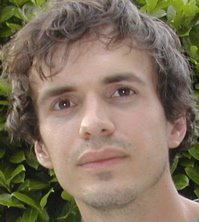Vieng Poukha
It's been four (or five?) days since arriving in Laos and the pace of life is very different here. It's so slow that I feel like a crazy New Yorker in comparison. The sense of time is completely different, and I'm slowly adjusting to the more relaxed pace.
We spent a lazy day in Huay Xai on the border before heading up to Vieng Poukha, a tiny town about halfway between the border and Luang Nam Tha in northern Laos. This town is barely a blip on the map, even in Laos. It's on what will someday become a major highway connecting China, Thailand and Laos, but for the time being it's a slurry of mud and a complete environmental nightmare. Considering that the Luang Nam Tha National Protected Area borders this soon-to-be highway, the issue of conservation and land management is very important. In addition to numerous hill tribes, the protected area is also home to black soprano gibbons, the most endangered species of monkey in the world.
In Vieng Poukha, we stayed in a trucker guesthouse with no electricity. Our shower was an outhouse with a faucet and a metal bowl. Nobody speaks English, with the exception of a few guides at the Ecotourism project here, and their English was not so good either.
We stopped in Vieng Poukha because we'd heard about this E.U. sponsored ecotourism project. Unlike the touristy and unsustainable trekking opportunities in northern Thailand, this one seemed much better.
We spent a lazy day in Huay Xai on the border before heading up to Vieng Poukha, a tiny town about halfway between the border and Luang Nam Tha in northern Laos. This town is barely a blip on the map, even in Laos. It's on what will someday become a major highway connecting China, Thailand and Laos, but for the time being it's a slurry of mud and a complete environmental nightmare. Considering that the Luang Nam Tha National Protected Area borders this soon-to-be highway, the issue of conservation and land management is very important. In addition to numerous hill tribes, the protected area is also home to black soprano gibbons, the most endangered species of monkey in the world.
In Vieng Poukha, we stayed in a trucker guesthouse with no electricity. Our shower was an outhouse with a faucet and a metal bowl. Nobody speaks English, with the exception of a few guides at the Ecotourism project here, and their English was not so good either.
We stopped in Vieng Poukha because we'd heard about this E.U. sponsored ecotourism project. Unlike the touristy and unsustainable trekking opportunities in northern Thailand, this one seemed much better.


0 Comments:
Post a Comment
<< Home